- Home
- Terry C. Johnston
Sioux Dawn, The Fetterman Massacre, 1866 Page 2
Sioux Dawn, The Fetterman Massacre, 1866 Read online
Page 2
Seamus remembered that while his fellow Irish grew thin and sickly, and far too many died on that Godforsaken ship, the rats grew plump and sleek. Feeding on the flesh of dead Patlanders cursed with dreaming of something better in that new country called Amerikay.
Ship-borne carnivores every bit as big and fat and sleek as the rats of Boston when that cursed ship landed, spewing forth those who had survived the trip, like human refuse upon the far shore. Shoved across the deck and laughed at, each one spat upon by the British sailors as they scurried weakly down the gangway onto the foreign soil of Massachusetts. Boston, young Seamus had been told the sign above him read. Boston—where at last his uncles would be waiting with their arms open to take him in.
Donegan found no uncles waiting. Not so much a whisper of their coming, or of their going from Boston Town, Amerikay.
And that first night of countless many he spent huddled in an alley doorway out of the cold drizzle of a March rain turning slowly to snow, young Seamus Donegan promised himself he would find the two uncles who had led a mother to send her firstborn son to the new world. Promised himself until then to fill his belly and sleep dry—no matter what he had to do. No job too dirty or immoral. He would survive. And by god—Seamus Donegan promised himself. He would never sit in the rain again. Alone. Hungry. Drenched and frozen to his marrow. And crying.
“Donegan!”
He rolled his big frame slowly onto his shoulder. It hurt where some soldier had swung a chair leg or axe-handle against the meaty part of his arm. Wincing in pain, rising slowly out of that sweet, delicious dream-state, Seamus listened as the other prisoners shouted and scuffed their way out the rough-hewn guardhouse door.
“Donegan!”
That insistent voice loomed a lot closer. In the guardhouse itself. He heard the rough-hewn door of the guardhouse scrape across its jamb, then slam shut. He slept on a pine-wood frame cot, the tick suspended on a woven rope netting. Room enough in the tiny cell for that six-foot bed, inches too short for his frame. That bed, and room enough for the prisoner to pace back and forth beside it. Six tiny feet by six prison feet.
Maybe they’ll all leave me alone now. Let me sleep off the rest of this blessed hangover. Instead, he sensed someone at his cell door. By the saints! Seamus Donegan’ll get no more sleep this day!
“Talk to me, Mr. Donegan.” The boy’s voice pleaded.
“Don’t wanna talk to nobody!” Instantly feeling sorry for the young soldier, Seamus burrowed his head deeper beneath the smelly wool blankets the army grudgingly issued its prisoners.
Too gray a day to be worrying about a bleeming thing. The army may throw Seamus Donegan in another guardhouse, but they’ll never have my stripes again. He peeked from one bloodshot eye. A little sun. Fine, that is for a man with a head as big as mine. Sun, and a helluva lot of blessed cold, just four days till Christmas, i’tis. Any good Irish lad likes to dream himself about good Christmas cheer. Especially Christmas cheer.
“Donegan, the colonel himself sent me fetch you. C’mon.”
For the first time he actually listened to the clatter outside the crude log guardhouse the 18th Infantry had built here in the middle of Sioux hunting-ground upon arriving last July. The thump of feet hammered across ground frozen like an iron-hardened anvil. Men hollering. He’d heard that peculiar sound in throats before, when soldiers stood on the edge of battle—not one soul among them knowing if he would return.
Like a frightened bird taking flight above the clamor rose an infant’s cry. Then the scream of a woman. That brought Donegan up. He swung his legs over and sat on the edge of his cot, the hair standing at the back of his neck. Perhaps it was … Noone’s wife. The one with the new baby. He remembered her eyes. And the other. Wheatley’s woman. The remembrance of the sun touching the droplets of water across the freckled skin of her firm, hardened breasts as she bathed in the Little Piney warmed him across his loins. He hoped it would not be the one he hungered for.
“Colonel and Ten Eyck want you.”
“Ten Eyck?” he grumbled, his brogue thick as his swollen tongue. “What’s that one-eyed Dutchman want w’ me now?”
“Wasn’t really the captain,” the young soldier answered. “He was agin it at first.” He fumbled with the ring of keys he carried nervously before him. “It’s the old man himself wanted to bust you out of the guardhouse. Old man sent me to fetch you.”
“The old man?” His voice was raspy, thick with the peat of his mother soil. He looked at the young soldier, really nothing more than an overgrown boy. Like he had been come to America on that stinking ship of death. And this boy before him had those same pink cheeks sprouting their first soft fuzz. Seamus felt sorry for any youth wasted in uniform.
“Yeah.” The soldier swung the cell-door open and Donegan towered past him, shouldering sideways into the narrow hallway that joined six small cells.
“Ten Eyck don’t want you,” the soldier explained. “But the colonel said he’s ordered to take you along.”
“Hold on a minute, me boy.” With a hand shoved against the young soldier’s chest, Donegan nudged him against the log wall. Squinting against the glare, he stared out the door at the scurry of men and scrambling animals on the parade of Fort Phil Kearny, Dakota Territory. Till that moment his hungover brain had been as thick as the whiskey-dried tongue roaming his mouth. But now something sneaked in to arouse Seamus Donegan where he lived. “Ten Eyck don’t want me along for what? Them bleeding savages swoop down on the wood train again?”
“Yeah, just about—”
“Tell Ten Eyck … and your colonel, too—I ain’t going again. I’m tired of chasing the bleeming sons up and down the hills. The red bastirds don’t stand and fight like men, they——”
“Mr. Donegan, sir.” The lad was breathless. “This ain’t got a feather to do with Ten Eyck or the colonel. It’s got to do with Captain Fetterman.”
Like a ragged piece of torn cloth Donegan’s wind caught in his chest. His eyes narrowed as he turned back to study the soldier. Suddenly he read fear etched across the boy’s face, etched like acid on glass. Something permanent. Unforgiving.
“Your name?”
“Meacham. Private Meacham, sir.”
“Don’t sir me. I ain’t a sergeant no more. Colonel knows that. Knows what blaggard put me in this hole too. Brown. Fetterman’s boon friend. I’m a damned civilian, I am! So, you don’t ‘Sergeant’ me no more, Private Meacham. It’s your army. Ain’t mine. Hear me?”
“What about the colonel? He sent me to fetch you!”
A familiar tension sparked across the shoulders as wide as an axe handle with room to spare. In the cold, windowless darkness at the end of the guardhouse hallway, the scarred Civil War veteran felt the young boy shudder.
“Tell me what you know … busting me out to see the colonel—about Fetterman. He and Brown not content to put me in their hole? Eh? Fetterman hisself want my ass to stew in a fine army broth for what I done to his friend Brown?”
“N-No … Donegan.” Meacham trembled again. He watched Donegan wipe his huge hands on the front of his bloodied wool coat. Studying the Irishman’s puffy face. A black eye. The swollen lips. A cut cheek and gashed forehead, both red and angry, crusted with blood and blanket lint. Meacham remembered that just last night it had taken seven of them to pull Donegan down. Seven troopers to drag this ox of an ex-cavalry sergeant off to the guardhouse … to throw the man into this tiny cell. Seven goddamned men——
“Well, Fetterman won’t get a chance to cock me like that bastird Brown did! I’ll ride—straight over the hills afore the bleeming cap’n has another chance to shame Mrs. Donegan’s boy——”
He stopped, listening. The rattle and creak of saddle tack reached his ears. The familiar snorts and pawing restlessness of army horses when they sensed better than any soldier what it was they were asked to ride into. With those sounds came a rush of warmth, a homey, familiar feeling of returning to what he loved to do. The tightness to his breath that o
nce more said this was what he was as a man. A soldier. A warrior, above all.
“The colonel figures—this time it’s you got to help Fetterman,” Meacham stuttered.
“Help Fetterman? Brown’s mate? Bloody chance of that!” he roared. By now he’d dragged the youth toward the doorway where an icy draft flung itself against his bloody cheek. A handful of new recruits yanked a half-dozen old, ill-fed horses out of the stables onto the snow-packed parade. Seamus whirled on Meacham. His gray eyes narrowed.
The young soldier gulped. “Colonel thinks Fetterman’s likely got himself in trouble. He’s crossed Lodge Trail Ridge.”
“Fetterman’s crossed the Lodge Trail?” he echoed, snagging the front of Meacham’s tunic.
He nodded dumbly. “Says you’re to ride with Ten Eyck. Help the captain—”
“Help that damned incompetent Dutchman?”
“Colonel says you gotta go with Ten Eyck—you’re the only one can bring Fetterman back.”
“The hell! Colonel thinks I should go pull Fetterman’s ass out of the fire … when it’s Fetterman himself who didn’t speak-up for Seamus Donegan! Twice! When Fetterman’s reeky friend Brown got a mite tight in his cups and picked a fight with the wrong man … me!”
“Every trooper on this post thinks there’s only two soldiers here worth their salt,” Meacham began, then his eyes fell to his scuffed boot-toes. “Captain Fetterman and … Sergeant Donegan.”
“Ain’t a sergeant no more. Told you——”
“You may not be a sergeant, Seamus Donegan—but you’ll always be a soldier.”
Meacham and the Irishman turned as one when the new voice cracked the cold darkness of the guardhouse.
“What I said is the truth, Sergeant Donegan.” Colonel Henry B. Carrington stood at the guardhouse door, flanked by captains Powell and Ten Eyck. “Not only do the men think you and Fetterman are the only real soldiers here … but most of the officers feel the same. Now, if you’d be good enough to come—I’ve got a relief party to send out.”
Carrington whirled, his face carved with worry and confusion as it gazed up at the Irishman. “Brown went with Fetterman. They’ve crossed Lodge Trail Ridge. The matter of Brown’s charges against you can wait. For now, you ride with Ten Eyck. You’re the last cavalry officer we have. Bingham died. Sergeant Garrett rode out with Fetterman.” He shook his head, eyes misting in the bitter cold. “The captain might have need of your advice, Mr. Donegan.”
Donegan turned to study Ten Eyck’s bearded face. The Dutchman’s one droopy eye, a wound he would suffer the rest of his life as reminder of that bloody war with Confederates. “Cap’n?”
Ten Eyck swallowed. “Mr. Donegan. I need your help. Sounds like Fetterman’s got himself in a real … real——”
“Donnybrook?”
Ten Eyck nodded. “Yes.”
“Cap’n.” Donegan snapped himself ramrod straight and saluted as smartly as any academy man. “Besides the bunch of green shavetails left you in this stockade, looks like I’m the last horse sojur you got. And whatever Fetterman’s marched hisself into on the other side of Lodge Trail Ridge, it’ll take a horse sojur to get Fetterman out. Let’s ride!”
Chapter 1
“For fifteen summers,” Red Cloud repeated in the stillness of the Lakota Sioux council lodge.
Come now the short-grass time of the Indian warrior, spring come to the high plains in this year the white man marked as eighteen and sixty-six. The short-grass time when ponies grew fat on the new, green shoots and young men prepared for war.
“Too long have we waited for the white man’s word to grow good,” Red Cloud emphasized, “to grow good like the grass that raises its head across our hunting lands and strengthens our ponies for war.”
“Wait for the white man’s word to grow good?” Miniconjou chief Black Shield asked. “Better to wait for tainted meat to turn sweet as buffalo tongue!”
“We have seen his every treaty used against us,” Red Cloud agreed sadly. “And those treaties he cannot use against us, he breaks.”
“First we watched the travelers who moved on west with the sun along the great medicine road.” Red Leaf spoke this time. “This was good, for they did not stop nor take root in our hunting grounds.” Red Leaf was Oglalla, of the same blood as Red Cloud. “But our eyes watched the buffalo killers and the ground scratchers follow in the shadows of those who passed on. And for three robe seasons now we have watched the others come pushing across our hunting lands: these who hurry to the land of the Crow, so they might dig at the ground for the yellow rocks. So many of these who hunger for the yellow rocks now.”
“Aiyee!” Black Shield swore. “I spit on the ones who killed pte, our brother buffalo, only for his skin. I spit on those who scratch at the ground like gophers—more every year. My heart tells me the talking paper of the treaty-men at Laramie is only for fools to believe.”
“Fifteen summers ago,” Red Cloud reminded, “we gathered at the soldier’s post—Laramie—with great hope that we would be left alone to hunt and live as our old ones lived for time beyond any one man’s memory.” He watched the older council members nod in remembering. “The white talkers told us they wanted only a road for their wagons going toward the setting sun. They said if they could have the road through our land, we could hunt as our old ones hunted long before the white man ever came.” His eyes moistened. “We gave them their road.”
“The white man said he came only for the road—but he has robbed us of everything else!” Black Shield shouted. “If he is not content to keep his promise … why should the Lakota?”
“That is for the Lakota to decide,” Red Leaf replied. “The council of the seven bands must answer for themselves.”
“Some are as old women,” Red Cloud spat. “Those loafers who sleep each day in the shade of the soldiers’ fort, telling the whiteman they speak for all the mighty Lakota nations on every treaty now—putting their marks to the white man’s talking paper. Spotted Tail’s Brule … and——”
“They are old women! No better than toothless camp dogs, waiting to take what the white man hands them! They don’t deserve to be called Lakota Sioux. Those bands who bow to the white soldiers—my mouth dares not call them fighting men!”
As one the old chiefs turned. They craned their necks, eager to see who had blurted the strong words into this lodge crammed with bodies on a breathless early-summer afternoon. A cooling breeze finally crept under the rolled-up buffalo hides of the lodge, stirring the braids and loose hair hung along the serious faces. Each of them sat upon the thick, furry robes of pte, their brother buffalo. Around them rose the circle of monstrous lodge-poles straining for the pale-blue sky in a gentle swirl that met at the smoke-hole above them all. The council lodge was, as always, a jumble of tobacco and sweat, cold meat and close bodies. A revered place of earth-skinned men come to decide upon mighty things.
Red Cloud’s eyes found the brash young speaker.
“Curly? You speak of these as old women. Do you have council to give?” the chief of the Bad Faces inquired.
In his eighteenth summer, the tall, sinewy warrior rose quickly, beads of sweat glistening across his bare shoulders and chest. “I have, Uncle,” he said, addressing his chief with a term of respect.
Curly paid no attention to the mutterings of the older warriors crowded into the steamy lodge. With the elk-horn quirt hung at his wrist, he pointed south.
“We know the soldiers will march north. Last summer we fought soldier-chief Connor and his army. He crept down on one small Arapaho village … destroying it … sending our cousins into the hills. Then he raised his dirt fort on the Powder River.”
“Curly is right!” Black Shield interrupted. “We should have stopped the soldiers on the Powder.”
“We were tricked … again,” Red Cloud soothed in that voice of his, like slow water caressing a pebbled streambed. “The white man had the loafers who live in the shadow of Fort Laramie’s walls sign his treaty paper.”
“Connor’s word guaranteed the Lakota would keep all land between the Paha Sapa—the white man’s Black Hills—and the Big Horns.…” Red Leaf added. “Everything from the white man’s medicine road at Laramie in the south, up to the Yellowstone River in the north.”
“The white man spits out his smooth promises, just to make us give him this new road into the Crow lands where white men hunt the little yellow rocks for three winters now.”
“No man in this lodge put his mark to that treaty!” Curly roared. “No man here agreed to that robbery!”
Red Cloud motioned Curly to sit. “We know the loafers who camp near Laramie signed the treaty-papers for the rest of the Lakota nations.”
“Spotted Tail. And the other old women like him!”
“Yes, Black Shield,” Red Cloud responded. “Sadly, we have come to expect no better from them. Their council is worthless. The word they give the whiteman worth even less. My brother warriors—the real Lakota live here!” He slammed the palm of one hand against the packed ground beside him. A puff of dust rose, particles like flecks of gold spun into the late-afternoon light that slanted into the lodge. “It is here the Lakota will stay.”
“You say we should not go to this great council called by the treaty makers at Laramie this summer?” Red Leaf asked.
Red Cloud shook his head. “We will go. We will listen to what the white man says. We will hear what Spotted Tail and his old lapdogs have to give away to the white treaty makers this time.”
“This journey will be a wasted march!”
A new voice rose from the ranks of the young warriors in the outer circle. Beside Curly a stocky, middle-aged warrior scrambled to his feet. For many summers Man-Afraid-Of-His-Horses had raided the Crow and Shoshone for scalps and ponies. For many summers Man-Afraid had fought the white men who brazenly marched across Sioux land. Younger than most of the other chiefs, yes. But about his shoulders Man-Afraid carried the mantle of respect. A great war-chief. He was without fear.

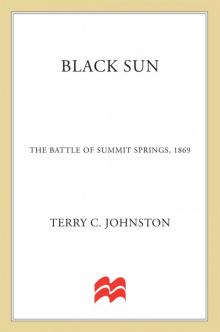 Black Sun, The Battle of Summit Springs, 1869
Black Sun, The Battle of Summit Springs, 1869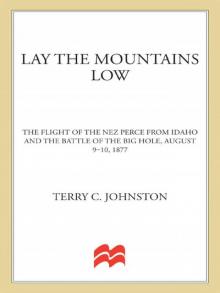 Lay the Mountains Low
Lay the Mountains Low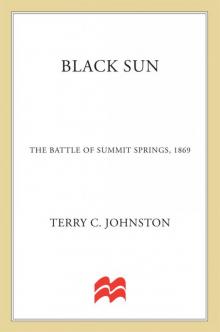 Black Sun: The Battle of Summit Springs, 1869 (The Plainsmen Series)
Black Sun: The Battle of Summit Springs, 1869 (The Plainsmen Series)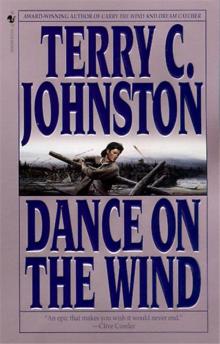 Dance on the Wind tb-1
Dance on the Wind tb-1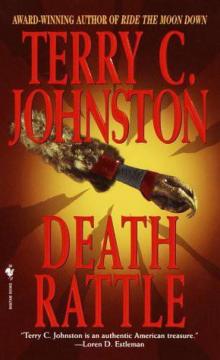 Death Rattle tb-8
Death Rattle tb-8 The Stalkers
The Stalkers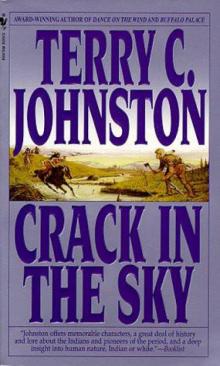 Crack in the Sky tb-3
Crack in the Sky tb-3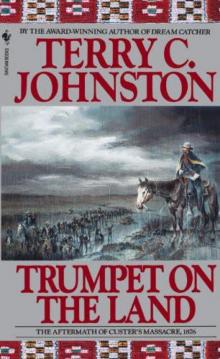 Trumpet on the Land: The Aftermath of Custer's Massacre, 1876 tp-10
Trumpet on the Land: The Aftermath of Custer's Massacre, 1876 tp-10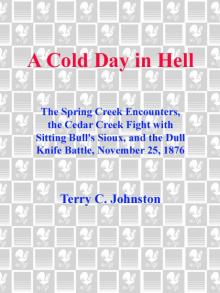 A Cold Day in Hell
A Cold Day in Hell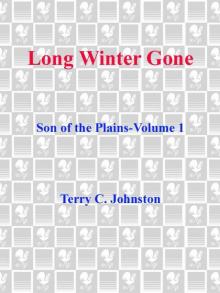 Long Winter Gone: Son of the Plains - Volume 1
Long Winter Gone: Son of the Plains - Volume 1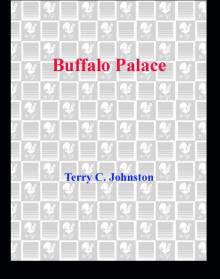 Buffalo Palace
Buffalo Palace Cries from the Earth
Cries from the Earth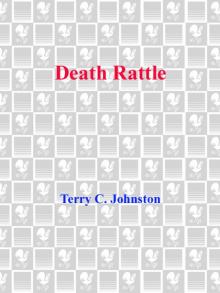 Death Rattle
Death Rattle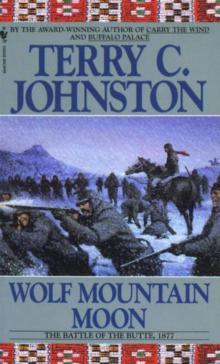 Wolf Mountain Moon: The Battle of the Butte, 1877 tp-12
Wolf Mountain Moon: The Battle of the Butte, 1877 tp-12 Crack in the Sky
Crack in the Sky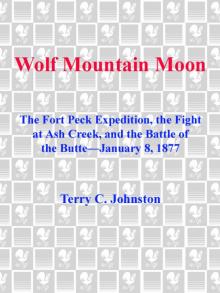 Wolf Mountain Moon
Wolf Mountain Moon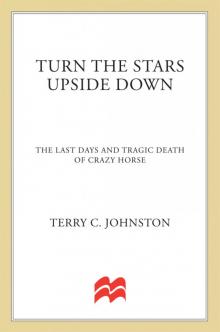 Turn the Stars Upside Down: The Last Days and Tragic Death of Crazy Horse
Turn the Stars Upside Down: The Last Days and Tragic Death of Crazy Horse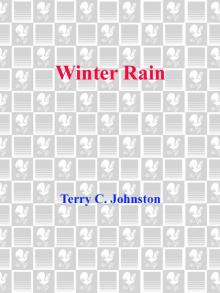 Winter Rain
Winter Rain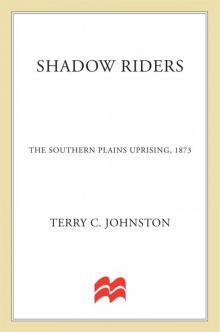 Shadow Riders: The Southern Plains Uprising, 1873 (The Plainsmen Series)
Shadow Riders: The Southern Plains Uprising, 1873 (The Plainsmen Series)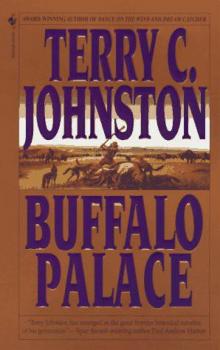 Buffalo Palace tb-2
Buffalo Palace tb-2 Cries from the Earth: The Outbreak Of the Nez Perce War and the Battle of White Bird Canyon June 17, 1877 (The Plainsmen Series)
Cries from the Earth: The Outbreak Of the Nez Perce War and the Battle of White Bird Canyon June 17, 1877 (The Plainsmen Series)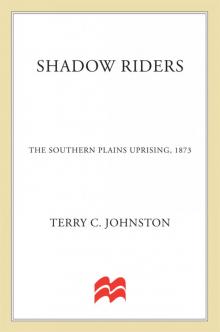 Shadow Riders, The Southern Plains Uprising, 1873
Shadow Riders, The Southern Plains Uprising, 1873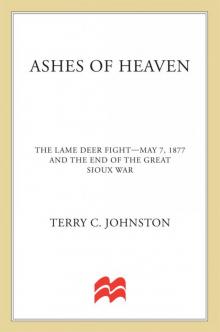 Ashes of Heaven (The Plainsmen Series)
Ashes of Heaven (The Plainsmen Series)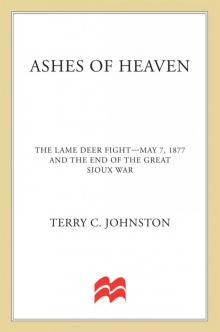 Ashes of Heaven
Ashes of Heaven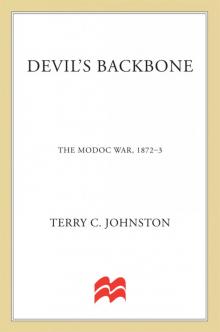 Devil's Backbone: The Modoc War, 1872-3
Devil's Backbone: The Modoc War, 1872-3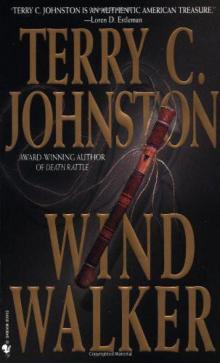 Wind Walker tb-9
Wind Walker tb-9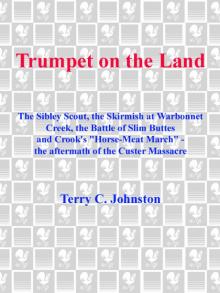 Trumpet on the Land
Trumpet on the Land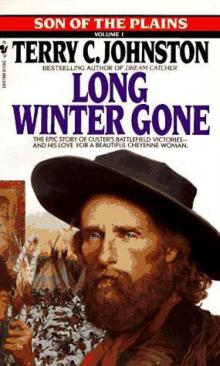 Long Winter Gone sotp-1
Long Winter Gone sotp-1 Dying Thunder
Dying Thunder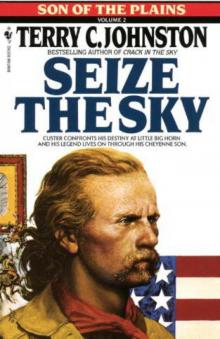 Seize the Sky sotp-2
Seize the Sky sotp-2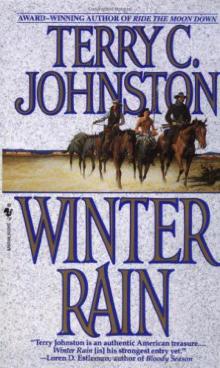 Winter Rain jh-2
Winter Rain jh-2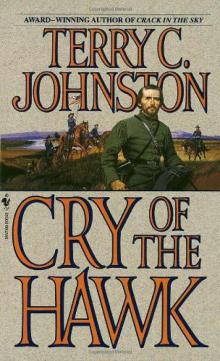 Cry of the Hawk jh-1
Cry of the Hawk jh-1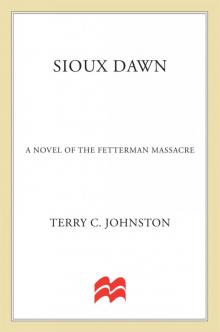 Sioux Dawn, The Fetterman Massacre, 1866
Sioux Dawn, The Fetterman Massacre, 1866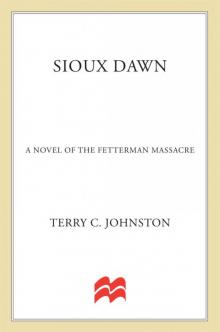 Sioux Dawn: The Fetterman Massacre, 1866 (The Plainsmen Series)
Sioux Dawn: The Fetterman Massacre, 1866 (The Plainsmen Series)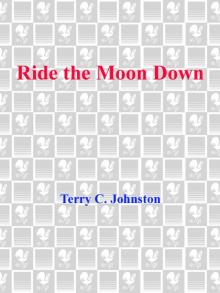 Ride the Moon Down
Ride the Moon Down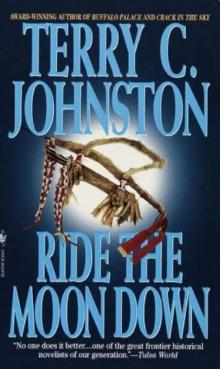 Ride the Moon Down tb-7
Ride the Moon Down tb-7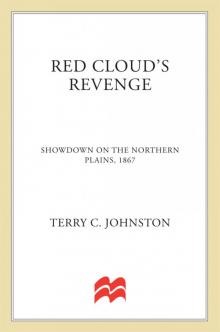 Red Cloud's Revenge
Red Cloud's Revenge Wind Walker
Wind Walker